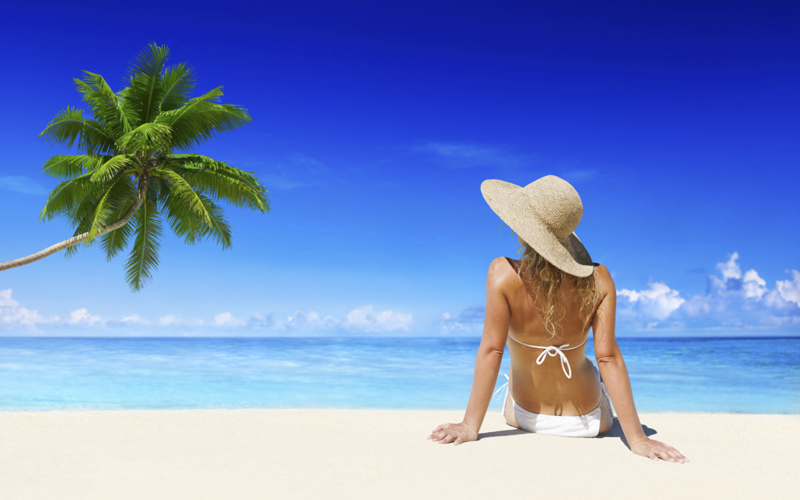
by guest blogger Isaac Eliaz, MD, MS, LAc, integrative medicine pioneer
Summer activities can feel like extreme sports—even if you’re just driving to the store. With record-breaking temperatures, high-intensity adventures, late-night parties, and more, it’s definitely a season of endurance with its own unique health risks.
Here are seven to look out for:
1. Burning your skin with junk food. We all know the importance of protecting our skin from sunburn by staying out of the midday sun, wearing protective clothing, and using natural sunscreen. However, what many people don’t realize is that the foods you eat may be even more important in determining your skin’s vulnerability to damaging UV rays. Just as unprocessed, nutrient-dense, and low-sugar foods can support your skin against premature aging, these foods can also help protect against sunburns in general. On the other hand, pro-inflammatory foods like sugars, alcohol, processed foods, and trans fats can impair our natural defenses against UV rays, allowing skin to burn more easily. Stock up on antioxidant-rich foods like berries, pomegranate, mushrooms, tomatoes, green vegetables, unsweetened chocolate, sweet potatoes, green tea, and raw nuts and seeds. Omega-3 fatty acids, found in flax and chia seeds, walnuts, and cold-water fatty fish like salmon, also help protect skin against burns and premature aging.
2. Wearing the wrong sunglasses. If you’re using a pair of dark sunglasses that DON’T have proper UV protection, you’re risking greater damage to your eyes than if you weren’t wearing any shades at all. Many inexpensive sunglasses don’t offer adequate UV protection, and darker lenses dilate your pupils, allowing even more UV radiation in, which can permanently damage your retinas. Make sure you choose a pair with a rating of UV 400.
3. Charring your health with BBQ. Barbequing is a great summertime activity, but grilled meat can also pose a big risk to health. Grilling or cooking meats at high temperatures produces a number of toxic compounds, such as AGEs (advanced glycation end products), that can wreak havoc on health. Furthermore, commercial BBQ sauces contain sugar and as such, which increase the production of these harmful chemicals. However, research shows that by marinating meats in antioxidant-rich spice mixes that use beneficial spices like rosemary, ginger, garlic, or turmeric, you can limit the production of these harmful compounds while enhancing other antioxidant health benefits—and flavor!
5. Using your fan when it’s too hot inside. If your AC is broken or you just use a fan, make sure you don’t keep the fan on in an already-hot room. Without cooled air to circulate, using a fan in a hot room just blows hotter hot air onto you, evaporating sweat and preventing you from cooling down. This scenario is an easy way to induce a deadly heat stroke, especially at night when you’re asleep.
6. One too many drinks. Dehydration plays a big role in heat stroke, and usually we don’t even realize we’re dehydrated until it’s too late. Summer parties and BBQs are a great opportunity to celebrate with friends and family—just beware of having too many alcoholic beverages, especially those that are easy to drink in the heat, such as ice-cold cocktails. In intense heat, limit yourself to one drink and be sure to stay hydrated with lots of water. Better yet, skip the alcohol altogether when temperatures are scorching and drink watermelon juice, coconut water, or other electrolyte drinks instead. Your body will thank you later.
7. Putting ice or ice-cold water on a sunburn. Many people want to cool their sunburns with ice or cold water—and in theory it might be refreshing for parched skin. However, the body reacts to extreme cold by producing more heat, which could intensify your burn. Instead, splash with cool water or try a cool compress on sunburned skin; reserve the ice for the punch bowl. Also, wait to apply oils or ointments until the redness goes down a bit, since topical remedies can irritate new sunburns. Maintain a healthy, balanced inflammation process with dietary supplements like modified citrus pectin, curcumin, and omega-3s to help reduce redness and restore skin health.
Summer is a wonderful time of year to enjoy the beautiful outdoors, spend quality time with family, and be more active in the longer days and warm nights. With more fresh produce available, it’s also a great time of year to be mindful about diet and emphasize nutritious, healing foods that can help reduce unhealthy inflammation and protect against heat damage. Balance your summer fun with soothing self-care rituals and simple preventative measures, and reap the incredible health benefits this season of abundance has to offer.
 Isaac Eliaz, MD, MS, LAc, integrates Western medicine with his extensive knowledge of traditional Chinese, Tibetan, Ayurvedic, homeopathic, and complementary medical systems. With more than 25 years of clinical experience and research, Dr. Eliaz has a unique holistic approach to the relationship between health and disease, immune enhancement, detoxification, and cancer prevention and treatment. For more health and wellness information, visit www.dreliaz.org
Isaac Eliaz, MD, MS, LAc, integrates Western medicine with his extensive knowledge of traditional Chinese, Tibetan, Ayurvedic, homeopathic, and complementary medical systems. With more than 25 years of clinical experience and research, Dr. Eliaz has a unique holistic approach to the relationship between health and disease, immune enhancement, detoxification, and cancer prevention and treatment. For more health and wellness information, visit www.dreliaz.org




Interesting tips! Just wanted to chime in about “…using your fan when it’s too hot inside. If your AC is broken or you just use a fan, make sure you don’t keep the fan on in an already-hot room. Without cooled air to circulate, using a fan in a hot room just blows hotter hot air onto you…”
I wonder a lot about the negative health (and environmental) effects of AC. In all but the hottest, most humid environments (and even there) ceiling fans are really effective if the residence has windows that can open (or even just an open door). I can imagine there might be folks who are using a fan in a room without windows, but there has to be a door somewhere to a room that has windows, right? The main idea is air exchange.
P.S. to the comment about windows that can open. My pet peeve about traveling is staying in accommodations where the windows don’t open! Talk about creating a problem where none would otherwise exist!
Hang on, I’m confused by #5 “evaporating sweat and preventing you from cooling down”. Evaporating is exactly how sweat cools you down. How does evaporating it, which cools you down, prevent it from cooling you down?
Number 5 is wrong. Evaporation is how sweat cools you. The physical process of evaporation consumes energy in the form of heat which is why we sweat in the first place.
Paula in theory what you say makes environmental sense, and I hate Duke Energy as much as anybody in the State of Florida, but…..we HAVE to have air conditioning. It is so humid from July through September that mold would be big problem and you would not be able to sleep as it is in the 80s at night. We do keep the temp at 78-80 and jump in the pool when it is sticky, icky hot and humid, but you would have an uprising in Florida without the air conditioning. That said, all the points made in the article are very interesting and especially pertinent since it is always summer here!
# 5 actually makes sense, if you consider that a fan would dry/evaporate your sweat at a much faster rate than your body can produce it, leaving you dry and overheated. “Fan Death” is an urban legend of sorts in SE Asia mostly but I can see how it relates to this comment. A/C may not be healthiest but if you’re at risk of heat stroke you better find a way to cool down…
I savour, cause I found just what I was having a look for. You have ended my four day long hunt! God Bless you man. Have a nice day. Bye|